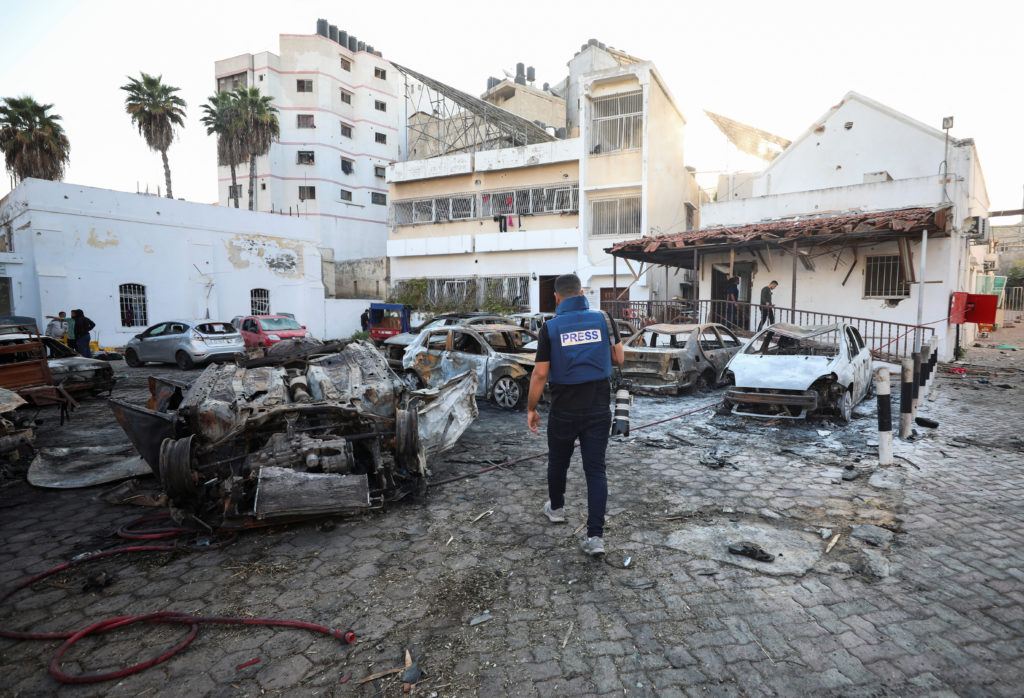Concerns Over UK Humanitarian Aid to Gaza
A recently uncovered UK government document has ignited serious concerns regarding the potential implications of British-funded humanitarian aid to Gaza. The document suggests that officials may have been aware of the risk that such funds could inadvertently support Hamas, the group currently governing Gaza. Although UK officials have firmly refuted these allegations, critics assert that significant questions remain unanswered.
Document Details and Background
Dating back to November 2022, the document was procured by NGO Monitor, an organization focused on transparency in humanitarian funding. It outlines the UK’s humanitarian strategy within the Palestinian territories, mentioning a cash assistance program in Gaza managed by UNICEF and coordinated with the Palestinian Ministry of Social Development (MoSD).
According to NGO Monitor, “The MoSD in Gaza is linked with the governing authorities, and thus UK aid may be directly or indirectly supporting the authority in Gaza (Hamas), a proscribed group.” This linkage raises issues about the oversight and control of the funds delivered to aid programs in the region.
Reputational Risks and Concerns
The report indicated that the British consulate-general in Jerusalem—believed to be the author of the document—evaluated this connection as a “reputational” risk. Importantly, this assessment focused more on public perception rather than legal ramifications, indicating a lack of transparency on the potential consequences of UK aid funding reaching Hamas.
Anne Herzberg, the legal advisor at NGO Monitor, emphasized the gravity of this revelation. “This is what shocked us the most,” she stated. “The government acknowledged the risk of UK funds reaching Hamas, but they were more concerned about appearances than the true danger of supporting terrorism.” This suggests a troubling negligence towards the severe implications of such support.
Government Response
In a statement to Fox News Digital, the UK’s Foreign, Commonwealth and Development Office (FCDO) denied that any funding reached Hamas-run entities. “We reject these allegations. The UK does not fund Hamas-operated agencies in Gaza,” an FCDO spokesperson affirmed. The statement clarified that the UNICEF program was coordinated with the Ministry of Social Development in Ramallah, under the Palestinian Authority, and that UK funding was directed solely towards vulnerable households in Gaza.
The FCDO reiterated that Hamas is classified as a terrorist organization under UK law, emphasizing that any support for it is considered a crime. Furthermore, they highlighted that the UK conducts thorough due diligence assessments of UNICEF and monitors fund distribution to ensure accountability to civilian recipients.
Inconsistencies and Deeper Implications
Herzberg pointed out inconsistencies in the November 2022 document and a subsequent report from UNICEF in March 2024, which celebrated a “strengthened partnership” with the Ministry of Social Development in Gaza. “The UK document clearly refers to the Gaza-based MoSD. If the program was only coordinated with Ramallah, it’s unclear why Gaza-specific risks were flagged,” remarked Yona Schiffmiller, director of research at NGO Monitor.
The March 2024 UNICEF report indicated that over 540,000 residents in Gaza received support following the attacks on October 7, asserting that cooperation with the MoSD facilitated access to social registries to identify the most vulnerable families. Notably, the MoSD in Gaza is led by Ghazi Hamad, a Hamas politburo member who was sanctioned by the U.S. Treasury in 2024, which raises further alarms regarding the distribution of aid and its implications.
Allegations of Aid Diversion
Herzberg claimed that the diversion of aid has been instrumental in Hamas’ preparation for the tragic events on October 7, during which they reportedly built tunnels, military facilities, and stockpiled resources. Even post-October 7, evidence suggests that Hamas continued tactics of seizing aid and exploiting a black market, raising concerns about the lack of transparency and oversight.
“Even after October 7, they still resist addressing aid diversion,” Herzberg asserted. “There’s no transparency, no oversight, and the U.N. actively obstructs Israeli, U.S., and allied efforts to improve aid conditions.” This lack of accountability raises critical questions about the efficacy of current aid initiatives and the ethical implications surrounding them.
International Concerns and Investigations
A recent investigation conducted by Israel’s “Shomrim” and Channel 12 has revealed that Hamas has established a significant fundraising network in the UK. Senior Hamas operatives with British citizenship are reportedly founding charities that raise millions annually, some of which support the group’s military operations.
Udi Levi, the former head of the Mossad’s Counter-Terror Financing Division, commented on the troubling trend, stating, “Britain is becoming the main country transferring funds to Hamas, even after October 7.” This highlights the pressing need for more stringent measures aimed at preventing the misappropriation of humanitarian funds.
Broader Impacts and Ethical Responsibility
NGO Monitor’s report raises broader concerns regarding the operational integrity of other U.N. agencies in Gaza. With at least twelve agencies functioning in the region, the potential for similar diversion risks remains unclear. Herzberg emphasized that “The issue isn’t just legal compliance — it’s moral responsibility.” She urged that Western donors must adopt thorough precautions in their funding practices, noting that so far, “that hasn’t happened.”
Conclusion
The revelations emerging from the UK government document reflect significant flaws in the oversight of humanitarian aid directed towards Gaza. Questions surrounding the potential support of Hamas by means of aid highlight the urgent need for reforms and transparent distribution practices in order to ensure funds are reaching those in genuine need rather than being diverted to extremist entities.
